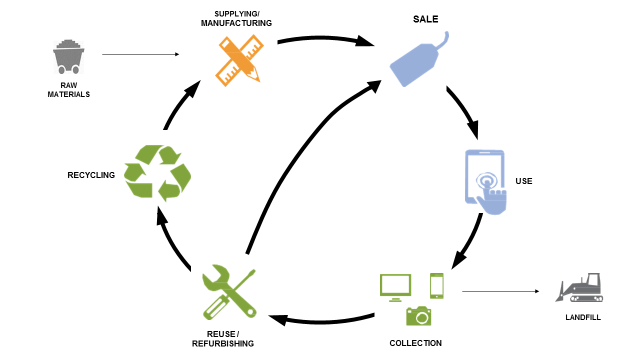The Importance of
E Waste Recycling
E waste recycling is an important part of reducing the negative impact on our businesses, our lives, and the environment. Even businesses have their junk drawers – closets or storage areas stacked with office equipment that’s no longer needed. More and more, those areas are being filled with obsolete electronics. Everything from old chargers to outdated computer equipment gets tossed into a pile and forgotten.
Or worse, it gets tossed into a landfill.
As the list of electronic devices that we rely on gets longer, their useful lifespan gets shorter due to rapid technological advances. Increased demand plus shorter lifespans equals even more “junk.” The piles of electronic waste become mountains.
The Growing Problem of E Waste
E-waste is the most rapidly growing waste problem facing the planet. Globally, more than 50 million metric tons of e-waste is generated each year. That’s equivalent to tossing out 1,000 laptops per second.
Businesses aren’t the only e-waste culprits. The everyday products that we rely on for modern life increasingly find their way into landfills. These include:
- Small electronic equipment such as microwaves and cameras
- Large electronic equipment such as dishwashers and air conditioners
- Screens and monitors
- Small IT such as cell phones and computers
With a world population over 8 billion and counting, electronics use and the resultant waste will only continue to grow. That’s why electronic recycling is important to take steps to address the problem.

Life Cycle Stages Of Electronics
Traditionally, the economy has been structured linearly. Resources are extracted to manufacture products which are sold, consumed, and disposed of. This take-make-dispose model consumes considerable resources and generates enormous amounts of waste. As an alternative to this exploitative system, the circular economy focuses on recycling and regeneration.

Source: EPA
By increasing the reuse, refurbishing, and electronic recycling, we can reduce the amount of global waste and the strain on the environment.
How E Waste Recycling Can Help
Electronic recycling helps keep products and materials in use as long as possible, minimizing waste at each life cycle stage and maximizing value. It benefits businesses, consumers, and the environment in the following ways:
Recycling Keeps Electronic Waste Out of Landfills
Electronic devices contain many heavy metals and toxic substances, including chromium, cadmium, mercury and lead. When e-waste is left to decay in landfills, these substances leach into the soil. Runoff from contaminated soil impacts waterways. Farms, animals, drinking water, and the food supply can all be negatively affected by these contaminants. Because of this, there are numerous state laws that ban e-waste from landfills. However, many countries don’t have such protections. A lot of e-waste finds its way to other countries, where it harms the inhabitants and their environment. Recycling electronic waste helps keep toxic substances from harming the environment and people both at home and abroad.
Recycling Helps Reclaim Valuable Materials
Electronic devices contain a wealth of valuable materials. These include precious metals such as gold, silver, and platinum. In fact, the precious metal deposits found in e-waste are up to 50 times richer than what is extracted from mined ore. E-waste also contains copper, aluminum, plastic, and glass. Most electronic devices are up to 100% recyclable. That makes it both easy and cost-beneficial to recycle.
Recycling Reduces the Need for Raw Materials
Electronic device manufacturing is dependent on high consumption of metals like iron, copper, silver, aluminum, gold, manganese, chromium and zinc. The process of extracting these raw earth materials inflicts damage to the environment. The rate of extraction is also much higher than they can regenerate in nature. Recycling e-waste allows the already extracted materials to be reclaimed. This reduces the demand for virgin materials, preserving important resources. EPA statistics show that one metric ton of circuit boards contains up to 800 times the amount of gold that can be mined from comparable-sized ore.
The Benefits Of Electronic Recycling
Responsible electronic stewardship benefits both industry and the planet. According to the EPA, increasing domestic e-waste recycling efforts in the United States can “reduce harm from exports of electronics waste (e-waste) being handled unsafely in developing countries, strengthen domestic and international markets for viable and functional used electronic products, and prevent health and environmental threats at home and abroad.“
GCI is an R2/RIOS Certified Electronics Recycler. That means we follow the strictest standards of equipment and materials management. We comply with and exceed all EPA regulations and guidelines, assuring the safety and proper handling of your unwanted electronic equipment.
For questions about e-waste recycling or to schedule a pick-up
or call 770-886-4200
